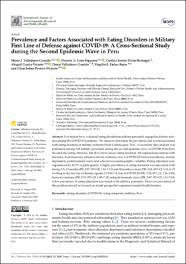“Prevalence and Factors Associated with Eating Disorders in Military First Line of Defense against COVID-19: A Cross-Sectional Study during the Second Epidemic Wave in Peru“

View/
Download
(application/pdf: 832.7Kb)
(application/pdf: 832.7Kb)
Date
2023-02-06Author(s)
Valladares-Garrido, Mario J.
León-Figueroa, Darwin A.
Picón-Reátegui, Cinthia Karina
García-Vicente, Abigaíl
Valladares-Garrido, Danai
Failoc-Rojas, Virgilo E.
Pereira-Victorio, César Johan
Metadata
Show full item recordAbstract
“: Few studies have evaluated eating disorders in military personnel engaged in defense activities during the COVID-19 pandemic. We aimed to determine the prevalence and factors associated
with eating disorders in military personnel from Lambayeque, Peru. A secondary data analysis was
performed among 510 military personnel during the second epidemic wave of COVID-19 in Peru.
We used the Eating Attitudes Test (EAT-26) to assess eating disorders. We explored associations with
insomnia, food insecurity, physical activity, resilience, fear to COVID-19, burnout syndrome, anxiety,
depression, post-traumatic stress and selected sociodemographic variables. Eating disorders were
experienced by 10.2% of participants. A higher prevalence of eating disorders was associated with
having 7 to 12 months (PR: 2.97; 95% CI: 1.24–7.11) and 19 months or more (PR: 2.62; 95% CI: 1.11–6.17)
working in the first line of defense against COVID-19, fear of COVID-19 (PR: 2.20; 95% CI: 1.26–3.85),
burnout syndrome (PR: 3.73; 95% CI: 1.90–7.33) and post-traumatic stress (PR: 2.97; 95% CI: 1.13–7.83).
A low prevalence of eating disorders was found in the military personnel. However, prevention of
this problem should be focused on at-risk groups that experience mental health burdens.
“
Collections
- SCOPUS [380]

